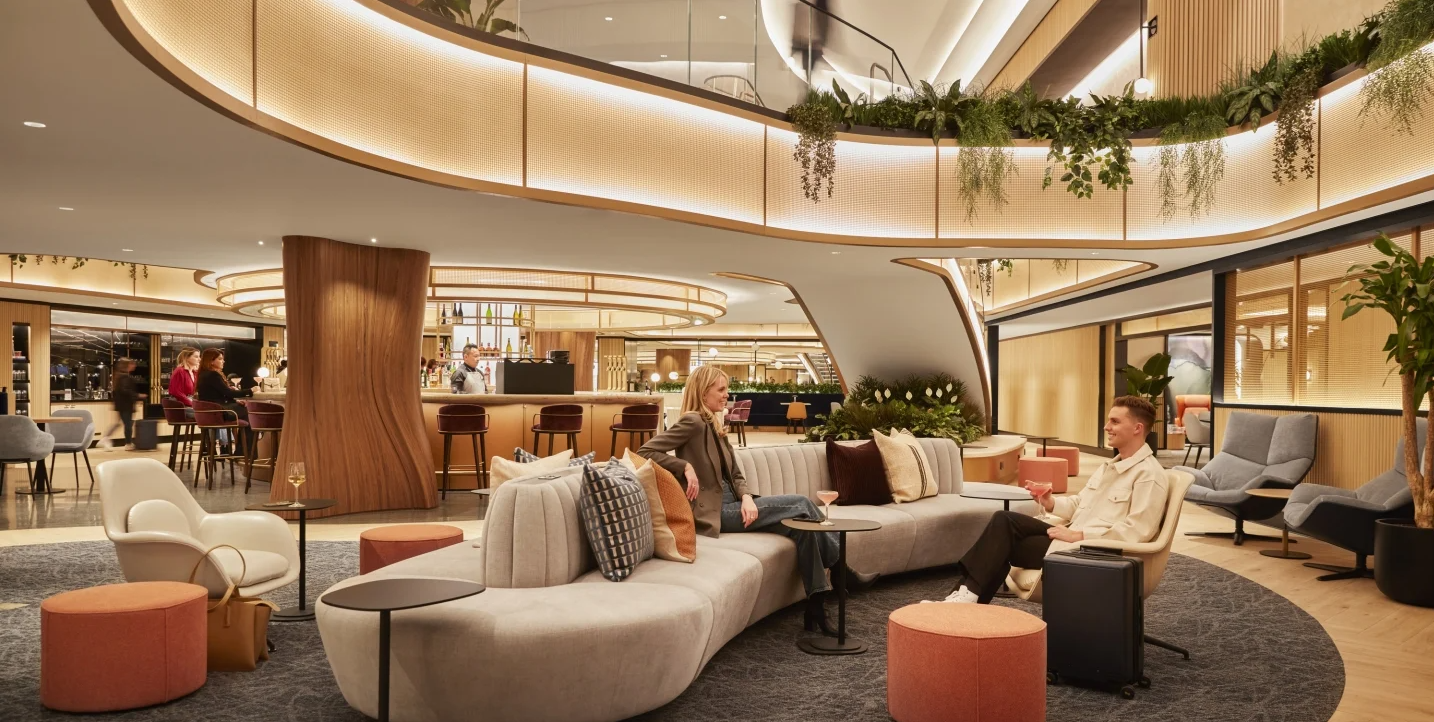 When it comes to interior design, technical skill and creativity are only part of what shapes a designer’s path. Equally important is the network of support, mentors, and peers that help translate a passion for workplace design into long-term impact. For me, this supportive network has been especially meaningful as I began to define my own design values and areas of interest, particularly in the evolving field of workplace design.
When it comes to interior design, technical skill and creativity are only part of what shapes a designer’s path. Equally important is the network of support, mentors, and peers that help translate a passion for workplace design into long-term impact. For me, this supportive network has been especially meaningful as I began to define my own design values and areas of interest, particularly in the evolving field of workplace design.
As a student, mentorship helped me begin to find my place in the industry, bridging the gap between classroom learning and real-world practice. Whether through conversations with practicing designers or gaining insight during events and portfolio reviews, these relationships have helped clarify my goals and direction. Having industry connections makes the profession more approachable by offering a window into real project work, strategies for navigating challenges, and pathways to specialization.
Over the past few years, I’ve been actively involved with the International Interior Design Association’s New York Chapter (IIDA NY) in a variety of ways, from attending events like Career Night to leading NYIT’s Interior Design Student Association (IDSA), which works closely with IIDA as a parent organization. These experiences provided essential early exposure to the professional design community and gave me a sense of direction and belonging as I began to navigate the industry beyond the classroom. In-person engagement, whether through panels, networking, or studio tours, made it easier to build lasting relationships and stay informed on the realities of the field.
Many of the mentors I connected with were actively engaged in workplace strategy and shared real-world approaches to designing for flexibility, focus, collaboration, and inclusion, critical components of today’s offices. These conversations deepened my understanding of the workplace as a dynamic environment and helped me begin to carve out a niche in designing spaces that prioritize neurodiversity and well-being.

IIDA NY also played a key role in supporting my growth in early 2025 when I was honored to be one of the three recipients of the Hazel Siegel Scholarship from IIDA NY. This award enabled me to attend the IIDA SHIFT Conference in Dallas. The event brought together students, educators, and professionals from across the country for thoughtful conversations about the future of interior design. What stood out most was the diversity of perspectives, from regional differences in design practice to niche specialties and evolving workplace strategies. Speaking with peers and professionals highlighted the many ways designers find meaning in their work and reinforced my own interests in the commercial world.
Those conversations deepened my interest in how interior environments influence inhabitants’ general well-being. As a recent graduate of the New York Institute of Technology with a focus on commercial interiors, I’ve been especially drawn to the role design plays in cognitive performance and accessibility in the workplace. Creating environments that support a range of sensory and neurological needs is not just a design trend; it’s a growing responsibility. Having access to professionals who could share firsthand experiences, challenge my assumptions, and point me toward areas of growth has been invaluable in shaping how I approach these topics.
This foundation of learning and mentorship paved the way for the next step in my professional journey. Most recently, I completed an internship with Corgan, a commercial architecture and design firm, and was fortunate to be offered a full-time position. That opportunity was made possible, in part, by the relationships and visibility I developed through IIDA. It was the product of layered support, built over time through consistent engagement with a broader design community.
Interior design is a dynamic and evolving field that requires more than just technical skill and creativity. It is the meaningful connections, with mentors, peers, and organizations like IIDA NY, that truly shape a designer’s path and open doors to impactful opportunities. For students and emerging professionals, engaging with organizations like IIDA NY can offer a valuable structure for growth. From scholarships and leadership programs to informal conversations, those moments of connection provide insight that extends far beyond the classroom. They make it possible to navigate the profession with greater awareness, stronger support, and a broader understanding of what’s possible.
As workplace design continues to evolve, embracing inclusivity, accessibility, and well-being, it’s essential to engage with communities that challenge and support us along the way. Investing in these relationships not only builds a foundation for growth but also helps cultivate the thoughtful, human-centered design approaches that will define the future of our profession.
Lydia Mudd is a recent graduate of the New York Institute of Technology and a 2025 recipient of the Hazel Siegel Scholarship from IIDA NY. Passionate about inclusive workplace design, Mudd’s senior capstone explores how to foster intuitive collaboration within different cognitive processes to create a more productive and mentally stimulating business model. She currently works as a Project Specialist at Corgan, following a nine-month internship with the firm as a Student Interior Design Intern.
















July 30, 2025
How mentorship and community shape the future of workplace design
by Lydia Mudd • Comment, Workplace design
As a student, mentorship helped me begin to find my place in the industry, bridging the gap between classroom learning and real-world practice. Whether through conversations with practicing designers or gaining insight during events and portfolio reviews, these relationships have helped clarify my goals and direction. Having industry connections makes the profession more approachable by offering a window into real project work, strategies for navigating challenges, and pathways to specialization.
Over the past few years, I’ve been actively involved with the International Interior Design Association’s New York Chapter (IIDA NY) in a variety of ways, from attending events like Career Night to leading NYIT’s Interior Design Student Association (IDSA), which works closely with IIDA as a parent organization. These experiences provided essential early exposure to the professional design community and gave me a sense of direction and belonging as I began to navigate the industry beyond the classroom. In-person engagement, whether through panels, networking, or studio tours, made it easier to build lasting relationships and stay informed on the realities of the field.
Many of the mentors I connected with were actively engaged in workplace strategy and shared real-world approaches to designing for flexibility, focus, collaboration, and inclusion, critical components of today’s offices. These conversations deepened my understanding of the workplace as a dynamic environment and helped me begin to carve out a niche in designing spaces that prioritize neurodiversity and well-being.
IIDA NY also played a key role in supporting my growth in early 2025 when I was honored to be one of the three recipients of the Hazel Siegel Scholarship from IIDA NY. This award enabled me to attend the IIDA SHIFT Conference in Dallas. The event brought together students, educators, and professionals from across the country for thoughtful conversations about the future of interior design. What stood out most was the diversity of perspectives, from regional differences in design practice to niche specialties and evolving workplace strategies. Speaking with peers and professionals highlighted the many ways designers find meaning in their work and reinforced my own interests in the commercial world.
Those conversations deepened my interest in how interior environments influence inhabitants’ general well-being. As a recent graduate of the New York Institute of Technology with a focus on commercial interiors, I’ve been especially drawn to the role design plays in cognitive performance and accessibility in the workplace. Creating environments that support a range of sensory and neurological needs is not just a design trend; it’s a growing responsibility. Having access to professionals who could share firsthand experiences, challenge my assumptions, and point me toward areas of growth has been invaluable in shaping how I approach these topics.
This foundation of learning and mentorship paved the way for the next step in my professional journey. Most recently, I completed an internship with Corgan, a commercial architecture and design firm, and was fortunate to be offered a full-time position. That opportunity was made possible, in part, by the relationships and visibility I developed through IIDA. It was the product of layered support, built over time through consistent engagement with a broader design community.
Interior design is a dynamic and evolving field that requires more than just technical skill and creativity. It is the meaningful connections, with mentors, peers, and organizations like IIDA NY, that truly shape a designer’s path and open doors to impactful opportunities. For students and emerging professionals, engaging with organizations like IIDA NY can offer a valuable structure for growth. From scholarships and leadership programs to informal conversations, those moments of connection provide insight that extends far beyond the classroom. They make it possible to navigate the profession with greater awareness, stronger support, and a broader understanding of what’s possible.
As workplace design continues to evolve, embracing inclusivity, accessibility, and well-being, it’s essential to engage with communities that challenge and support us along the way. Investing in these relationships not only builds a foundation for growth but also helps cultivate the thoughtful, human-centered design approaches that will define the future of our profession.
Lydia Mudd is a recent graduate of the New York Institute of Technology and a 2025 recipient of the Hazel Siegel Scholarship from IIDA NY. Passionate about inclusive workplace design, Mudd’s senior capstone explores how to foster intuitive collaboration within different cognitive processes to create a more productive and mentally stimulating business model. She currently works as a Project Specialist at Corgan, following a nine-month internship with the firm as a Student Interior Design Intern.